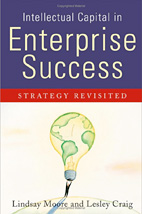Achieving brand relevance is a strategic task that, by its very nature, is never complete in the volatile markets of our rapidly changing societies. Each and every day more brands enter the marketplace. Ironically, as their numbers increase, there are fewer and fewer brands that really stand for anything significant in the minds of the public.
Brand equity critical in firms’ valuation (PDF)
With the dawn of the Age of Intellectual Capital, during the mid ’90s, came the realization that the real wealth in the modern enterprise is located in the intangible assets of that enterprise—as opposed to the “traditional (tangible) assets” such as real estate, plant, equipment, inventory, cash and the like.
Liberation Marketing and Consumer Society
Corporate marketers and advertising agencies eventuated “Liberation Marketing” to trump Lifestyle Marketing. The theory was that brands would pose as revolutionaries acting on our individual behalf by selling the apparatus of “cool,” “hip,” “alternative” – without of course ever actually being cool, hip, or alternative themselves.
Enhancing Profitability with Intellectual Property (PDF)
Even companies with small IP portfolios can leverage their holdings into the free cash flow of licensing income by parsing their IP holdings.
Patents Can Protect Formulations and Processes (PDF)
Many manufacturers overlook the opportunity to patent aspects of their food products or specialised manufacturing processes. This is especially true in the natural products industries, where unusual ingredients are often mixed together and specialised production processes are increasingly required to make successful products. In most natural product categories, it takes substantial innovation for manufacturers to be able to produce successful functional and natural food products.
The State as a Brand
Brand gurus have long declared that all public entities and identities, and not just consumer packaged goods, are “Brands.” Today we see the truth of that assertion as we recognize the emergence of the “Brand-State.”
Reverse Engineering for Competitive Advantage (PDF)
Reverse engineering competitors’ formulations is legal, can be ethical and can benefit a company’s strategic position in the marketplace – if it is pursued in the right way. As such, reverse engineering is a powerful product-development tool that can be used to trump even patent-protected formulations or proprietary compounds, thus enhancing a company’s place in the marketplace.

 As the knowledge-based economy expands, the companies and individuals that possess intangible intellectual assets, such as intellectual property, will need specialized expertise, strategic thinking, legal experience, and the wisdom necessary to manage intellectual assets.
As the knowledge-based economy expands, the companies and individuals that possess intangible intellectual assets, such as intellectual property, will need specialized expertise, strategic thinking, legal experience, and the wisdom necessary to manage intellectual assets.